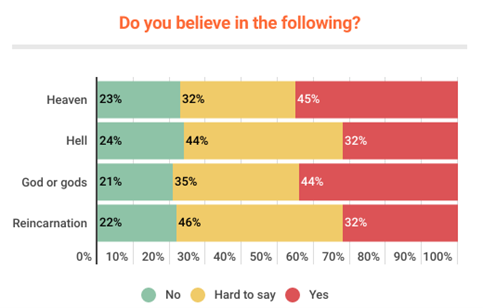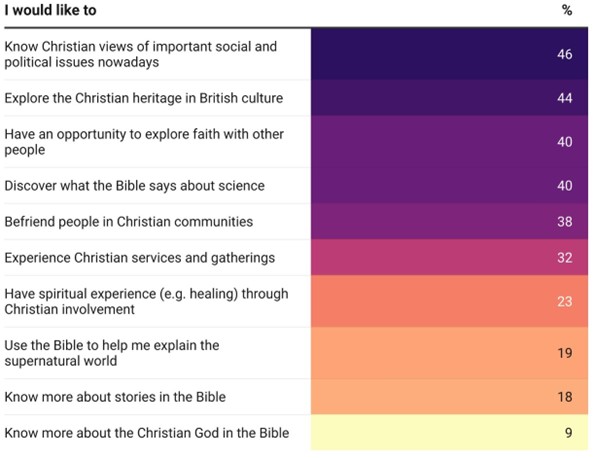In the first article of this series, readers were presented with an overview of key trends and characteristics of the British Chinese Christian community, depicted through a social scientific research approach using empirical data. Over the past two years, nearly 200,000 Hong Kong immigrants arriving in the UK through the British National (Overseas) Visa Scheme (BN(O)) have made the Chinese population the fastest growing and most dynamic harvest field in the UK. Yet it is also characterized by its decentralized and diverse nature.
Now, let us turn our attention to the non-Christian members of the Chinese community. In this article, I will continue to explore the spirituality of non-Christian Chinese in Britain and their perceptions of the Christian faith, based on the Bible and the Chinese Community in Britain (BCCB) research project conducted by the British and Foreign Bible Society from 2021 to 2023.
According to the latest 2021 England and Wales Census, 17% of ethnic Chinese identify as Christian. Although this percentage is higher than that of Christians in mainland China, Hong Kong, and Taiwan, it is still significantly lower compared to the 62% who identify as having no religious affiliation. Therefore, understanding how this group, which constitutes nearly two-thirds of the Chinese population in the UK, views Christianity and what potential interactions they may have with it becomes a crucial focus of the BCCB. When the BCCB delved into the beliefs of the religiously unaffiliated Chinese, it became clear that they are far from being encapsulated by a simple label of “religious nones.” When the survey asked 410 respondents whether they believe in heaven, hell, God or gods, and reincarnation, in all four items, those who answered “yes” were more than those who answered “no.” Additionally, a considerable number of respondents display agnostic views, especially on the questions of hell and reincarnation. It is evident that although Chinese people (especially those from mainland China) are often associated with atheism, in reality, true atheists are a relatively small minority even among those who claim to have no religious affiliation.

It has been noted in the previous article that the current British Chinese churches have attracted many new Hong Kong BN(O) immigrants. Sociologists would argue that the appeal of the church to non-believer immigrants largely stems from its significant social functions. For new immigrants, attending church is a worthwhile investment—you can gain important ethnic and social capital such as practical help, emotional support, essential information, and friendship without much cost. These resources play a crucial role in their integration into local society and the establishment of a sense of belonging.
However, the BCCB found that the interest of Chinese people outside the church in Christianity might not be as consumeristic as it seems. When asked, “Are you interested in exploring the Christian faith?” only 35% of the 675 non-Christian respondents (Including 410 individuals with no religious affiliation and 265 non-Christian believers) indicated “no interest at all,” with the remaining nearly two-thirds expressing interest in one or more aspects of Christianity. After tallying these various domains of interest, the following figure was derived.

Specifically, when asked which aspects of Christianity they wish to learn more about, 46% of respondents mentioned they would like to “know Christian views on important social and political issues nowadays.” Additionally, 44% expressed interest in “exploring the Christian heritage in British culture,” and 40% were interested in the topic of science and faith. Meanwhile, items on the “social” level were also notably mentioned. Those who mentioned wanting “an opportunity to explore faith with other people” and “to befriend people in Christian communities” accounted for 40% and 38% of respondents, respectively.
This indicates that although the motivation for Chinese participation in church activities is indeed related to the church’s social functions, the real attraction of Christianity to Chinese people might not be that aspect. Instead, what non-Christian Chinese find most interesting about Christianity is its provision of alternative answers and explanations to key issues and challenges of the era they live in. For instance, in a focus group conducted simultaneously with the BCCB survey, involving new converts in Chinese churches (many of whom are of BN(O) background), several participants mentioned that Biblical teachings helped them overcome the impact and even trauma brought by drastic social and political changes in Hong Kong prior to their settlement in the UK, as the concept of reconciliation offered something they could not find in their upbringing influenced by Chinese culture. Others, especially young people and students, view Christianity as a proxy for British culture and Western thought. The majority of them are not necessarily interested in the personal, spiritual aspects of Christianity but are willing to engage with it on an intellectual level to help them understand their hosting society.

By contrast, we can clearly see that Chinese non-Christians do not have much enthusiasm for Christian scriptures and truth claims. Only 9% of all respondents mentioned that they wanted to “know more about the Christian God in the Bible,” with other items related to the Bible also ranking at the bottom of the list. Interestingly, if we restrict the sample to those who have attended church activities in the past four weeks, these percentages significantly increase. For instance, among these non-Christian church attenders, 52% showed a desire to learn more about God in the Bible. Despite the seemingly lack of interest in the theological aspects of Christianity, when church involvement is taken into account, it appears to effectively generate interest among non-Christian Chinese in issues relating to personal beliefs and spirituality on the vertical dimension of Christianity.
The key point to grasp in the article is that the British Chinese community holds a relatively open attitude towards faith and Christianity. There is a significant curiosity about its social, cultural, and ethical dimensions amongst those who appear to be religiously unaffiliated in the census. The appeal of Christianity appears to extend beyond its spiritual teachings, touching upon a desire for community, understanding of British culture, and alternative perspectives on contemporary issues. This nuanced engagement suggests that the relationship between the Chinese community and Christianity is multifaceted, driven not only by the search for social support and ethnic homogeneity, but also by a genuine interest in the broader questions of life and society that Christianity addresses in transnational contexts. As the British Chinese Christian community continues to grow and evolve, particularly with the influx of Hong Kong BN(O) immigrants, it stands as a dynamic field of potential interaction and mutual enrichment between faith and culture, challenging and expanding the traditional boundaries of religious affiliation and belief.
Image credit: Moujib Aghrout via UnSplash; intext image courtesy of the author.

Yinxuan Huang
Dr. Yinxuan Huang is a research manager at the British and Foreign Bible Society. He was research fellow and coordinator for the Bible and the Chinese Community in Britain research project at the London School of Theology (2021–23), His main research interests are in sociology of religion, Chinese Christianity, East …View Full Bio
Are you enjoying a cup of good coffee or fragrant tea while reading the latest ChinaSource post? Consider donating the cost of that “cuppa” to support our content so we can continue to serve you with the latest on Christianity in China.